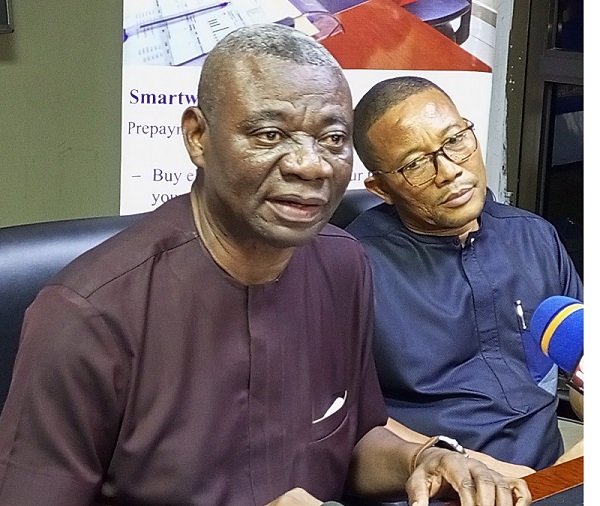Hot!
Take advantage of moratorium, rectify meter status – ECG tells customers

Electricity Company of Ghana (ECG) has encouraged customers to take advantage of the moratorium it has declared to audit meters countrywide to avoid brushes with law.
The one-month moratorium is from June 7 to July 7, 2022, and will afford customers to report to ECG District and Regional Offices for rectification of post-paid customers who have meters but do not receive bills.
It extends also to prepaid customers whose meters are faulty, customers who have by-passed or tampered with their meters and are, therefore, not paying for the full cost of power usage as well as those who have engaged in any form of electrical illegality.
“Please note that after this moratorium, customers who are caught stealing electricity, which is criminal, will be charged with the offence of stealing in accordance with the law and their names shall be published widely,” Director, Customer Services of ECG, Mr Abraham Anokye Abeberese told journalists at a news conference at Takoradi in the Western Region on Wednesday.
The meter audit, he said, was part of a field survey to be done by ECG officials to update customer information.
Mr Abebrese explained that after the expiration of the moratorium, a Task Force would be visiting premises to effect the exercise and hoped customers would comply with the new directives.
He added that “when the teams visit, they will leave slips for customers who might not be at home to indicate their telephone numbers for further directions”.
Again, he indicated that future bills would also be sent through SMS text messages.
The ECG Customer Service Director told journalists that in line with Public Utilities Regulatory Commission benchmarks, the company was desirous to deal with about 30 percent losses.
He stressed “ We want to seal the leakages and so we want all customers to participate in this exercise because the commercial loss is the worry.”
From Clement Adzei Boye, Takoradi
Hot!
Education free, but parents have roles to play – Anloga DCE

Madam Sandra Seyram Kpedor, the District Chief Executive (DCE) of Anloga in the Volta Region, has emphasised the importance of parental involvement in children’s education, stating that education is free, but parents need to do more to support their children.
She said parents, teachers, and students must be involved in addressing the challenges facing the district’s education sector, particularly the poor Basic Education Certificate Examination (BECE) results.
Madam Kpedor outlined some key roles parents should play to promote their children’s education, including providing a conducive learning environment, monitoring their children’s progress, and supporting teachers.
The DCE highlighted some challenges the district faced such as inadequate infrastructure and a shortage of teachers, which have also contributed to the poor BECE results and called on well-to-do parent to help solve the situation through and other supports.
To address the issues, she also announced that plans have been taken to utilise the district’s common fund to implement educational projects, such as constructing school blocks and teachers’ bungalows at Sodzi community, and 2-unit classroom blocks each at Akplorwutorkor and Tegbi-Afedome respectively, among others.
Madam Kpedor also noted that her office had earlier notified the Ministry of Education to deploy more teachers to the area to improve teaching and learning, and encouraged students to work hard and strive for excellence, and work beyond their limit to succeed.
“To my wonderful and beautiful girls, you have to know it clear that women and girls have equal opportunities to compete with men for greater achievements,” she indicated.
The DCE cited her own achievement as a testament to the fact that women can excel in leadership positions, alongside Vice President Nana Jane Opoku-Agyemang, and stressed that girls were no longer limited to domestic roles but can pursue their dreams and become leaders.
Additionally, she mentioned that a meeting was held earlier with assembly members, and other stakeholders to address the district’s educational challenges and improve academic performance.
She promised that the district’s education oversight committee and stakeholders would work together to address the challenges and improve the district’s BECE results and called for parental involvement and support to boost the district’s education sector for children to chase their dreams to become future leaders for the success of the district and the nation.
She urged parents not to leave everything to the government but rather help in the provision of some necessary materials such as textbooks, exercise books, pens, pencils, food, and guidance to children for the successes of young learners. –GNA
Join our WhatsApp Channel now!
https://whatsapp.com/channel/0029VbBElzjInlqHhl1aTU27
Hot!
Dennis Miracles Aboagye criticises NDC’s “no fee stress policy” implementation

The spokesperson for Dr. Bawumia, Dennis Miracles Aboagye, has criticised the implementation of the NDC government’s No Fee Stress policy, arguing that the programme has failed to deliver on its core promise.
According to him on Starr fm, the policy, which was introduced to ensure stress free payment of fees for level 100 tertiary students, has rather turned into what he described as post stress support.
He explained that students are required to pay their fees first before applying for reimbursement, a situation he believes defeats the purpose of the policy.
He questioned claims by government officials that the policy has been successful and that citizens are happy.
In his view, such claims do not reflect the lived realities of many Ghanaians. He stressed that while some people may appear satisfied, many others continue to struggle.
Dennis Miracles Aboagye pointed to the situation of trained teachers and nurses who have been picketing for nearly six months, demanding employment.
He noted that government responses suggesting it cannot accommodate all of them contradict claims of economic stability.
He further argued that economic indicators such as a stable currency mean little to people who are unable to secure jobs or access promised support.
He observed that telling an unemployed teacher or a struggling student that the cedi has strengthened does not address their immediate challenges.
On the issue of tertiary education, he maintained that no level 100 student benefited from stress free fees in 2025, despite the policy being announced.
He added that in 2026, students have already reported to school without receiving the promised support.
He insisted that asking students to pay fees first and seek reimbursement later amounts to support after hardship, not stress free education.
According to him, this approach goes against what was promised during the policy announcement.
Dennis Miracles Aboagye questioned why a government that presents the economy as strong is unable to fulfil what he described as simple and clear promises.
He added that there is a fundamental problem with the way the economy is being managed and indicated that he is prepared to explain his position further.
By: Jacob Aggrey







